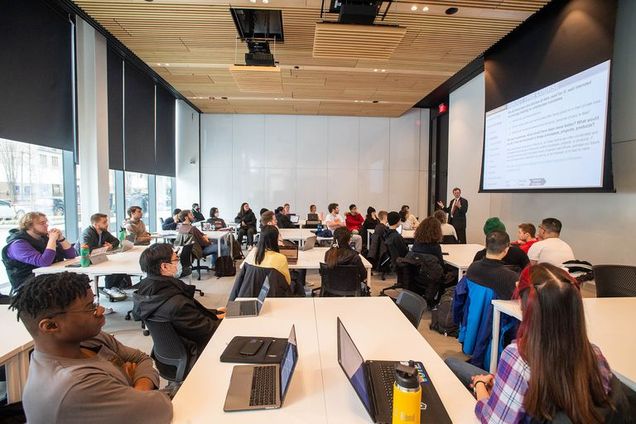Artificial Intelligence
From creating novel AI methods for predicting diseases such as Alzheimer’s and breast cancer, to catalyzing research at the intersection of AI and learning, to bolstering the country’s biopreparedness and reducing AI’s carbon footprint through cloud computing and data center innovations, Hariri Institute researchers are driving advancements in AI to solve pressing societal problems, bringing together expertise in computer vision, natural language processing, machine learning, robotics, and human-computer interaction. Below find just a few examples of the transformative AI-driven research happening at the Hariri Institute.
Research & Innovation at the Intersection of AI and Learning

The AI and Education Initiative at Hariri Institute facilitates research at the intersection of AI and learning for all people, of all ages and backgrounds, and all the topics and contexts where learning happens. This initiative transcends disciplinary boundaries, drawing on perspectives on learning spanning computing, education, design, social sciences, medicine, business, and beyond. Affiliated faculty use AI to inform human learning and teaching; take inspiration from human learning and teaching to advance AI; and build use-inspired AI technologies learners can use to transform themselves and the world.
New Computational Models for General AI

The Artificial Intelligence Research (AIR) Initiative at Hariri Institute is advancing research in machine intelligence. The cross-disciplinary research initiative that brings together researchers whose work aims to create intelligent systems that reliably make decisions, reason about data, and communicate with humans. The primary research focus is on new computational models aimed at general artificial intelligence, i.e., agents that exhibit the skills and learning capacity close to human ability.
AI for Surveillance
![]()
The Biothreats Emergence, Analysis and Communications Network (BEACON) is dedicated to the rapid collection, vetting, reporting, and analysis of information on emerging threats affecting humans, domestic animals, wildlife, plants and the environment globally. BEACON combines emerging infectious diseases surveillance, a global network of moderators who are subject matter experts and the power of artificial intelligence and large language models. At its launch, BEACON will be the only open-source global surveillance platform of its kind, linking public health authorities, practitioners, researchers, and the general public, rapidly and transparently sharing data and contextual knowledge about new threats. The program is based at Boston University’s Center on Emerging Infectious Diseases (CEID) and operated in partnership with the Hariri Institute for Computing and Data Sciences at Boston University and HealthMap at Boston Children’s Hospital.
